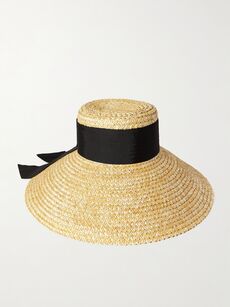Did You Know You Can Use Retinol In Summer? Here’s Why…
It’s a beauty myth that retinoids should be avoided in the summer to prevent irritation. In fact, they can – and should – be used all year round. MALENA HARBERS discovers the tricks to using the gold-standard skincare ingredient the right way, when UV rays, heat and humidity ramp up
The skin benefits are seasonless
“Retinoids [an umbrella term for all vitamin A-derived skincare ingredients] are key for preventing and combating signs of aging, and are excellent additions to most skincare routines year-round,” says New York-based dermatologist Dr. Dendy Engelman. “In fact, I strongly recommend that patients do continue using retinol all year.” If you’re using a prescription-strength retinoid, such as tretinoin, Dr. Engelman says that starting and stopping is generally not advised because your skin will most likely have to re-adjust (aka ‘retinize’) to the ingredient all over again after taking too long of a break – “and retinization is usually an unpleasant process that causes sensitivity, redness and acne breakouts.” On top of that, she says, “we don’t want to miss out on the amazing benefits of retinol for half the year.”
Retinoids actually prevent sun damage
“One of vitamin A’s incredible benefits is that it can block collagen breakdown, which is increased in summer due to extra sun exposure,” says Daniel Isaacs, director of research for Medik8. “So, by using retinoids in the summer, it can begin to counteract some of the sun damage that occurs throughout the sunny months.” Isaacs recommends using a photostable retinyl retinoate on the morning of a sunny day for this very reason. “As it’s photostable, it stays potent even in the sun, and it can help to mitigate collagen breakdown in real time. Then, applying retinol or retinal [which aren’t photostable] in the evening is also useful to correct any damage that has been caused throughout the day.”
They thicken, not thin the skin
Another big retinol myth is that vitamin A thins the skin. It actually does the opposite, according to Dr. Engelman. “Retinol stimulates collagen and elastin production in the skin, making the dermal layer thicker, firmer and stronger over time.” That means healthier, bouncier and, ultimately, more glowing summer skin.
Your summer retinol rules…
Start slow
“If you’re committed to sun protection, it’s absolutely OK and safe to start retinol in the summer,” says Dr. Engelman. The reality is that you can add retinol into your skincare routine during any time of year. It’s important to keep in mind, however, that when your skin is adapting to a retinoid, it can cause dry skin and peeling for some people – so it’s essential to start slow and see how your skin adjusts to the ingredient.”
Use a retinoid at night
“The one caveat is that retinol can make your skin more photosensitive, and therefore more susceptible to skin damage,” says Dr. Engelman. Plus, most retinoids themselves break down in UV light, so they become less effective. “That’s why you should only apply them at night, at any time of year.”
Hydrate thoroughly
“I recommend applying moisturizer on top of a retinol serum,” says Dr. Engelman. Moisturizers help to lock in all ingredients, while simultaneously providing nourishment and hydration. This is especially important when you’re using retinoids, since they can be drying and irritating to the skin.”
Commit to SPF
If there’s one hack the experts we spoke to stressed over and over, it’s that when using retinoids during the summer, you must use sunscreen religiously during the day. “Sun-safe behaviors, such as sun avoidance, broad-brimmed hats, sunglasses, daily topical antioxidants, and an SPF of 30 or higher – with frequent re-application – are all key here,” says Dr. Engelman. She says you can even use your retinol the night before a day at the beach, as long as you stick to these guidelines. “If this is challenging to adhere to, it’s better to stop using your retinoid for three to five days before your vacation, and during your vacation.”
Consider your skin type
“If your skin is very sensitive, you can swap out retinol for less-irritating alternatives, such as [the botanical ingredient] bakuchiol, which is safe to use in the sun,” says Dr. Engelman. The same rule applies if you use a lot of exfoliating ingredients in your existing skincare routine, such as AHAs, as they can cause your skin to become even more sensitive when exposed to sunlight. If you have a darker skin tone, which is often more prone to hyperpigmentation, you should also be aware of any other ingredients in your skincare routine that exfoliate the skin when using retinoids during the summer.
SUMMER-SUN ESSENTIALS
3 items
 EUGENIA KIMMirabel grosgrain-trimmed straw sunhat
EUGENIA KIMMirabel grosgrain-trimmed straw sunhat BOTTEGA VENETA EYEWEAREmbellished aviator-style tortoiseshell recycled-acetate and gold-tone sunglasses
BOTTEGA VENETA EYEWEAREmbellished aviator-style tortoiseshell recycled-acetate and gold-tone sunglasses ANYA HINDMARCHDouble Decker leather-trimmed nylon-jacquard and PVC cosmetics case
ANYA HINDMARCHDouble Decker leather-trimmed nylon-jacquard and PVC cosmetics case
RELATED READING
The model featured in this story is not associated with NET-A-PORTER and does not endorse it or the products shown


